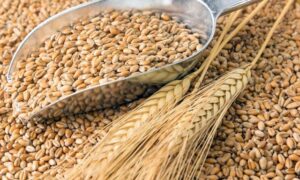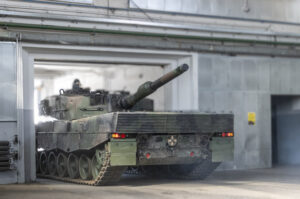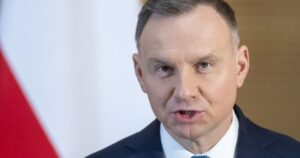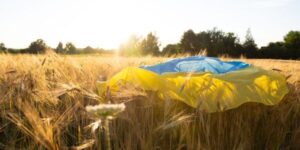
The first grain port in Poland will be built in Gdansk, in particular for the export of Ukrainian agricultural products, Minister of Agriculture and Rural Development Robert Telus said at a meeting with voters in Przysus, polskieradio24.pl reports.
According to the report, RSSI (Agri-Food Investment Company – IF-U) has signed an agreement with the Port of Gdansk to implement this project.
“On Tuesday, the state budget enterprise RSSI signed an agreement with the Port of Gdansk to create a grain port. We have a grain port,” the minister said, adding that this is an extremely important event.
He noted that the grain port will improve the transportation of grain, in particular from Ukraine.
The creation of further “solidarity corridors” that would allow the transportation of Ukrainian grain by sea is very important, he explained, while emphasizing that the lack of agricultural supplies to African countries is beneficial to Russian President Vladimir Putin.
As reported, on September 15, the European Commission announced that it would not extend restrictions on imports of agricultural products from Ukraine to five neighboring EU countries (Poland, Bulgaria, Hungary, Romania and Slovakia) under certain conditions that will help avoid a new sharp increase in supplies.
The restrictions were introduced on May 2 and applied to imports of wheat, rapeseed, sunflower and corn. These five Eastern European EU member states argued that Ukrainian agricultural products, when imported duty-free into the EU, were being deposited in their countries and were harming their local agricultural sectors.
After the restrictions were lifted, Poland, Hungary, and Slovakia imposed unilateral bans. Poland expanded the list of banned products to include rapeseed cake and meal, as well as corn bran, wheat flour, and derivatives. Hungary extended the list to 24 commodity items.
Ukraine filed a lawsuit with the WTO, accusing Poland, Hungary, and Slovakia of discriminatory treatment of its agricultural products.
Ukraine is currently negotiating the introduction of a mechanism for licensing the export of Ukrainian agricultural products with mandatory verification in each of the five countries.

Ukraine has received from Poland the first Leopard tanks repaired at the Bumar-Labenda plant, the Polish Arms Group (PGZ) has announced.
“While others are making statements about the future, we are acting in coordination with the Ukrainian side. The first Leopard tanks, which have undergone special modernization in Bumar-Labendy, were received by the Ukrainian side. Work is underway on the next vehicles,” the company said in a post on social network X (formerly Twitter).
“This clearly demonstrates that our priority is to provide real assistance to the Ukrainian military on the front line,” the statement said.
PGZ also noted that it is constantly expanding its cooperation in the supply of ammunition, spare parts and maintenance of equipment.

NATO Secretary General Jens Stoltenberg has expressed confidence that Poland and Slovakia will continue to support Ukraine after the upcoming elections, despite recent harsh remarks against Kyiv, Reuters reported on Friday, September 29.
“I expect and I am confident that Ukraine and Poland will find a way to resolve these issues without negatively affecting military support for Ukraine,” Stoltenberg said in an interview with Reuters.
It is noted that Poland, a NATO member, was until recently considered one of Ukraine’s staunchest allies in its war with Russia, but relations with it deteriorated after Poland’s decision to extend the ban on imports of Ukrainian grain.
Slovakia, a NATO member, is also an ally of Ukraine, supplying military equipment, including MiG-29 fighter jets and S-300 air defense systems. However, opposition leader and former prime minister Robert Fico, who is leading in pre-election polls, has vowed to end this military support, Reuters emphasizes.
“Whatever the new government in Slovakia, we will continue to sit in NATO meetings,” Stoltenberg said, “and I am confident that we will find ways to continue to provide support – as we have done after every election in this alliance since the beginning of the war.

Polish President Andrzej Duda calls it a good decision to maintain the ban on the sale of Ukrainian grain on the Polish market, while announcing his intention to increase its transit through Poland to help Ukraine and countries that need this grain, the Presidential Office’s X (formerly Twitter) reported on Sunday.
“I believe it is the right decision that the Polish government has maintained the ban on the sale of Ukrainian grain on the Polish market. However, it is necessary to do everything possible to ensure that transit is as high as possible,” Duda said in a commentary to the Polish TV channel TVP1.
According to him, transit corridors have already been prepared in Poland, thanks to which Ukrainian grain can travel through the territory of Poland and be exported to where it is needed. “We are trying to help Ukraine and those countries that need this assistance,” the Polish President emphasized.
“Thanks to the work of our farmers, we are self-sufficient. We do not need grain from Ukraine. Their excellent harvests during the war almost did not reach the countries that really needed them,” Duda said.

Polish President Andrzej Duda has said that Prime Minister Mateusz Marowiecki’s words that Warsaw is “no longer transferring weapons to Ukraine” were taken out of context, TVN24 reported on Thursday.
“In my opinion, the prime minister simply said this: we are not going to transfer to Ukraine the new weapons that we are now buying as part of the modernization of the Polish army,” the Polish president explained.
According to Duda, “We both had the same position. We cannot hand over to someone else our new weapons, which we are now buying for billions of dollars for the Polish army to strengthen it, to strengthen Poland’s security. To anyone.”
Duda specified that those contracts on Polish arms, which Poland signed with Ukraine, will be fulfilled.
At the same time, he recalled that contracts with Ukraine have been signed, including for the delivery of Polish self-propelled howitzers Krab. “We need to fulfill this contract, and we are fulfilling it,” Duda said, adding that there are other contracts concerning ammunition and demining equipment.
“As we receive new armaments from Korea, from the United States, we will also replace the armaments that are now in storage,” Duda said, noting that such armaments could be sent to Ukraine “as we did before, transferring post-Soviet armaments.”

Ukraine will file a lawsuit with the World Trade Organization (WTO) against Poland, Hungary and Slovakia over their refusal to lift the ban on Ukrainian agricultural products, Taras Kachka, Deputy Minister of Economy and Trade and Ukraine’s trade representative, told Politico.
“It is important to prove that these actions are legally unlawful. That’s why tomorrow we will start the court proceedings,” Kachka said last Sunday, adding that Kyiv is preparing to take retaliatory measures against Polish fruit and vegetable exports.
Commenting on the introduction of unilateral bans by Poland, Hungary and Slovakia on Ukrainian grain after the European Commission’s decision to lift the restrictions, Kachka said that “in our opinion, these measures by Hungary and Poland are a statement of total distrust of the European Commission.”
Ukraine’s trade representative believes that the open defiance of Brussels by Poland, Hungary and Slovakia was not just an internal EU matter, but caused what he called “the biggest systemic problem” – whether international trading partners can trust what Brussels says on behalf of the EU.
“For many years, the European Commission has been the mediator in trade negotiations and the trade policy institution for the entire EU. And we are used to working on this basis,” Kachka said, adding that, in his opinion, “the systematic approach of Budapest and Warsaw to ignore the position of the EU institutions in trade policy will be a problem for the EU as a whole, because there is no unity here.”
Kyiv plans to sue the three countries at the World Trade Organization rather than through its own trade agreement with the EU. “I think the whole world needs to see how EU member states behave toward their trading partners and their Union, because it can affect other states,” he emphasized.
While Slovakia simply extended the EU’s previous ban on four types of grain, Poland over the weekend introduced additional bans on Ukrainian flour and feed. Hungary, according to Kaczka, is going even further and banning 25 more products that were not previously discussed, including meat.
“These arbitrary bans are ridiculous. I think that Hungary is making a political statement here that it wants to block trade with Ukraine and completely ignore Brussels. And that’s why I think this is a very bold move against both of us by Budapest,” Kachka emphasized.
While Hungary’s additional bans are mostly symbolic, given that Ukraine does not export much beef and pork to the country, Poland’s measures will affect a significant portion of Ukraine’s exports, Kachka said. If Warsaw does not lift these additional bans, “we will be forced to take measures in response to additional products and ban imports of fruits and vegetables from Poland.”
The governments in Budapest and Warsaw have said they are acting to protect their farmers from a surge of Ukrainian produce that has led to lower prices, but Kaczka denied that reasoning is flawed: “The Polish ban will not help farmers, it will not affect prices because prices are global – what they do is based on public opinion.”
An EU official told the publication that Brussels hopes to solve this problem by forcing Kyiv to impose its own export restrictions in the event of a sudden surge in exports.
When asked about this potential agreement, Kachka said that Kyiv is ready to “take responsibility for ensuring that exports from Ukraine do not cause a tsunami in neighboring countries” and will introduce a system of “real-time” grain export licenses for both countries, which will slow down exports to neighboring countries and allow Ukraine to “react quickly” if a surge is detected.
As reported, the ban on the export of wheat, barley, rapeseed and sunflower seeds from Ukraine to Poland, Hungary, Slovakia, Romania and Bulgaria, introduced on May 2 for the period until June 5, was extended until September 15.
On Friday, September 15, the EU allowed the ban to be lifted after Ukraine promised to take measures to tighten export controls to neighboring countries. On the same day, Poland, Hungary, and Slovakia imposed unilateral bans on imports of Ukrainian agricultural products. In addition to wheat, rapeseed, sunflower, and corn, Poland banned imports of cereals and flour, while Hungary expanded the list to 25 items.